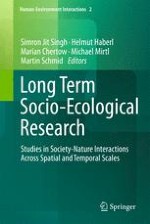2013 | OriginalPaper | Chapter
14. The Intimacy of Human-Nature Interactions on Islands
Authors : Marian Chertow, Ph.D., Ezekiel Fugate, M.Sc., Weslynne Ashton, Ph.D.
Published in: Long Term Socio-Ecological Research
Publisher: Springer Netherlands
Activate our intelligent search to find suitable subject content or patents.
Select sections of text to find matching patents with Artificial Intelligence. powered by
Select sections of text to find additional relevant content using AI-assisted search. powered by
